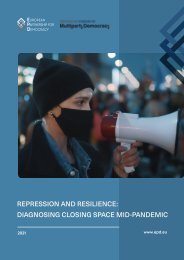Thinking Democratically: A Comprehensive Approach to Countering and Preventing Shrinking Space
You also want an ePaper? Increase the reach of your titles
YUMPU automatically turns print PDFs into web optimized ePapers that Google loves.
with a tenuous relationship with civil society negatively impacted civil society’s ability <strong>to</strong> defend<br />
democratic space.<br />
What is clear is that where European donors were unable <strong>to</strong> defend democratic space, it was because<br />
other interests were prioritised over the defense of democratic space, <strong>and</strong> that European donors lack<br />
a common approach <strong>to</strong> identifying <strong>and</strong> countering attacks on democratic space. This is reflected in<br />
the predominantly technical – rather than political – response <strong>to</strong> closing democratic space. The<br />
reduction in funding at a time of closing democratic space <strong>and</strong> the shift away from support <strong>to</strong><br />
advocacy activities <strong>to</strong>wards government-led agendas is testament <strong>to</strong> this more technical response. In<br />
cases where political pressure could have made a difference – as in Guatemala when the US left a<br />
vacuum for defending the CICIG – European donors failed <strong>to</strong> use their political weight <strong>to</strong> successfully<br />
defend democratic space. A careful wait-<strong>and</strong>-see approach <strong>and</strong> reengagement agenda with an<br />
authoritarian government – as in the case of Zimbabwe – does not adapt well <strong>to</strong> the gradual erosive<br />
effects of closing democratic space. Particularly in the face of an increasingly assertive China <strong>and</strong><br />
Russia, European donors need <strong>to</strong> proactively defend democratic space in a political manner, using all<br />
political <strong>to</strong>ols at their disposal.<br />
The exception <strong>to</strong> these trends among European donors has been Sweden, who launched a ‘drive for<br />
democracy’ initiative in 2019 <strong>to</strong> strengthen Sweden’s work on promoting democratic space. Sweden<br />
has long embraced an approach <strong>to</strong> closing space as one of democratic space, which includes but goes<br />
beyond the notion of civic space. An essential component of the ‘drive for democracy’ is the<br />
increased support for ‘voice-bearers’ <strong>to</strong> advocate for inclusive policy, including civil society<br />
organisations, as well as human rights defenders, political parties, research institutions, <strong>and</strong> networkbased<br />
movements <strong>and</strong> associations. 72 This model of engagement with civil society has been unique,<br />
with flexible 5-year agreement periods <strong>and</strong> core funding as a default mechanism of support. 73 The<br />
Swedish approach <strong>to</strong> closing space offers an practical <strong>and</strong> coherent model for a potential European<br />
approach <strong>to</strong> democratic space.<br />
72<br />
Sida (2020): Written communication: Sida’s work with democracy in development cooperation.<br />
73<br />
Presentation by Karin Fällman, SIDA. 4 March 2020, Permanent Representation of Sweden <strong>to</strong> the EU, Brussels.<br />
40

















